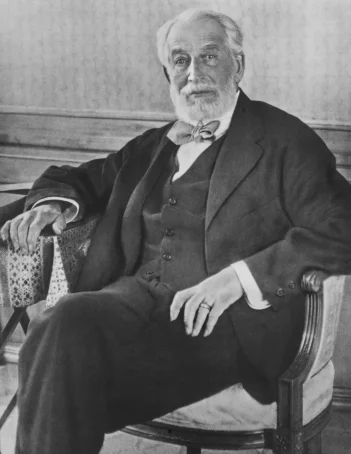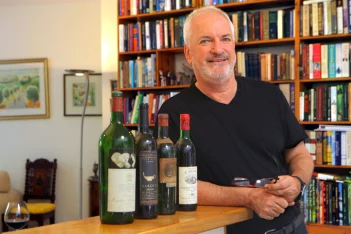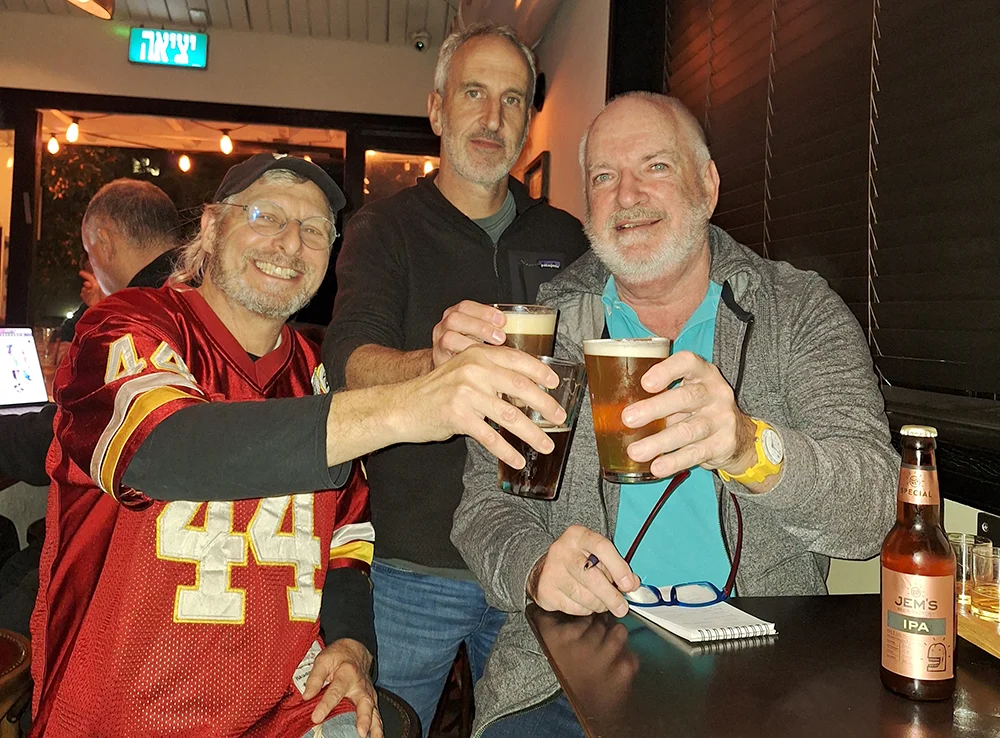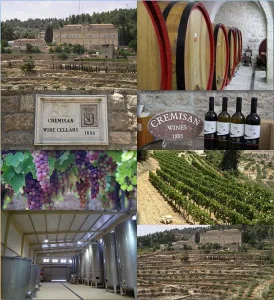This is a beer story from London to Ra’anana, via Rishon Le Zion and Petah Tikvah. I started my career in the beer industry working for Bass Charrington, who were brewers, pub owners, hoteliers and vintners. The group was the largest brewer in Great Britain and the largest pub owner. Bass Hotels & Resorts later became the largest hotelier in the world for a while, and Bass Charrington Vintners were owners of Chateau Lascombes of Margaux, the Bordeaux negociant Alexis Lichine and Hedges and Butler, a three-hundred year-old shippers of wines and spirits, with cellars under Regent Street. Bass from Burton-on-Trent and Charrington, from Mile End, London, were historic breweries themselves, both being founded in the 18th century. The red triangle of Bass was the world’s oldest registered trademark. However, the joint company broke up in 2000, when they decided to focus on hospitality rather than brewing. Mitchell & Butlers, itself dating from the 19th century, is today one of the leaders in pub, bars and restaurants in the UK. The hotel company was renamed Six Continents and is today known as the InterContinental Group. Bass Charrington is no more, forgotten by many. The iconic Bass Ale is still made, but today by Anheuser Busch – InBev. It was made immortal by Edouard Manet’s painting “A Bar at the Folies Bergere.’ I worked for 13 years for the group. It was owing to their broad interests that I was able to move from beer to wine and from pubs to restaurants and hotels, as my career changed direction and I became an active member of the wine trade.
I came to Israel in 1989 and spent the next 27 years working for the Golan Heights Winery and Carmel Winery. Carmel harbored a beer secret not known by many. The first ever Israeli brewery was the Palestine Breweries was founded in 1934 by Frenchman Gaston Dreyfus and James Rothschild. He was the son of Baron Edmond de Rothschild who had founded Carmel in 1882. Then the Jerusalem Post was known as the Palestinian Post and Jews living in the Holy Land had Palestinian passports! Go figure! The brewery was situated adjacent to Carmel’s Rishon Le Zion Wine Cellars. There was a wall between the brewery and winery. The folklore is that the workers used to barter before Shabbat, swopping beers for kiddush wine and vice versa. The story goes that the Technical Director of the winery and Brewmaster, who were usually sober before breakfast, used to meet and taste each other’s product to help them get through the day. When the British left, the market disappeared and the brewery was closed in 1960. It became incorporated into the winery. The only clue remaining was the decorative stone step at the entrance to the accounts depart. It showed an eagle and a frothing glass of beer.
 The reason was that the first beer brand was Nesher – an eagle. Even the first Goldstar was made there. Until today it is Israel’s largest selling beer. That step was still there when I left the winery in 2016, which was the year Rishon Le Zion Cellars was closed.
The reason was that the first beer brand was Nesher – an eagle. Even the first Goldstar was made there. Until today it is Israel’s largest selling beer. That step was still there when I left the winery in 2016, which was the year Rishon Le Zion Cellars was closed.
When I came to Israel, there was one brewery which was Tempo Beer Industries of Netanya. It was a monopoly. Soon after the Central Bottling Company founded IBBL, aka Carlsberg Israel in Ashkelon. In the 2000s the craft brewery market arose, starting with Dancing Camel. One of the new breweries of those days was a brewery called Jems. I lived in Ra’anana, a small town north of Tel Aviv. The main thing I knew about Jems was that the owners were from Ra’anana and the business plan was conceived there. When Jem’s Beers were launched they came onto the Israeli market like a whirlwind. Of all the craft breweries founded at the time, they probably made the biggest impression because of the style, quality and their marketing story. They produced craft beers in a country dominated by rather bland global brands. They called their creation a Beer Factory, rather than a Brewery. They branded their company in a rather unique, quirky, wacky way with fun icons that have stood the test of time and they opened a brew pub and bars which close the circle. Their Jem’s Beer Factory is not just to produce a tasty beer to drink. It is designed to bring people together to eat, drink and be entertained….and enjoy the beer while doing so.
I first came across their original Petah Tikvah brew pub on an unforgettable day for me, but for the wrong reasons. My late wife was in Beilinson Hospital for brain surgery. During the operation, my children and I were looking for a place to sit it out and we discovered the original Jems in Petah Tikvah. It was better than sitting for hours in the hospital waiting room. Even then, at a first glance, I could see that Jems had a unique quality of attracting a cross section of people from different walks of life. The customers came from all strands of the population. The clientele was more representative of Israel, than what I was used to in the wine trade.
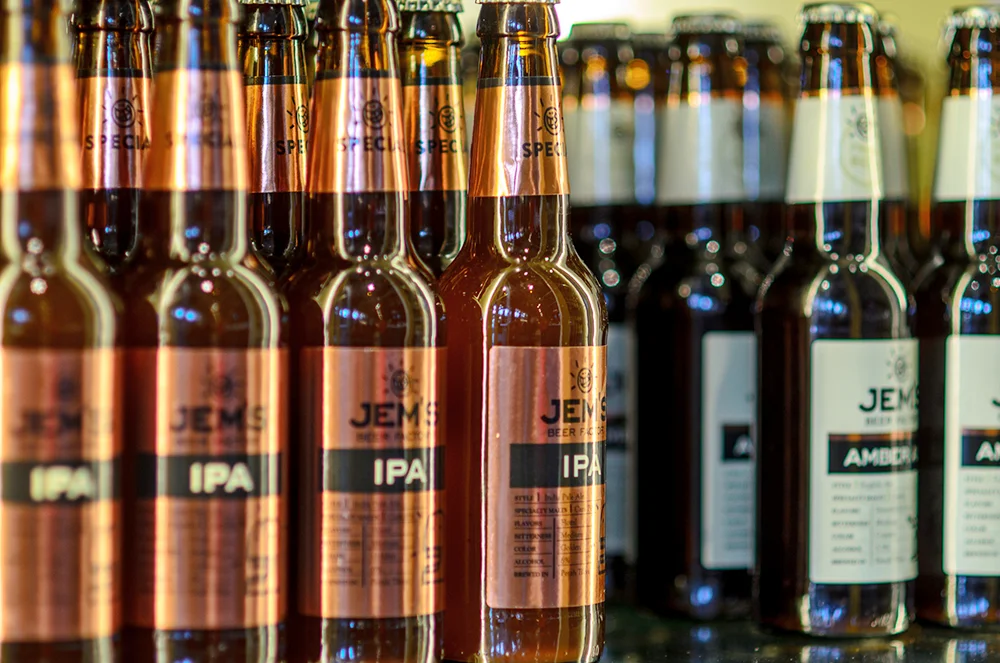
Owing to the Ra’anana connection, I had wanted to meet the owners of Jems for a while. However, the years past, and I supposed I was more focused on wine. Recently Carmel started to distribute Jems beers, their public relations contacted me, and a meeting was arranged. It only took me 15 years, but in the meantime, Jems has become very well established. The partners are Jeremy Welfeld and Daniel Alon. So it came to pass that these three sons of Ra’anana met for a beer, what else, as I listened to their story. Jeremy (aka Jem) is a great character, wearing the ever-present baseball cap; he has payot (or rather a paya), but on one side only. He has a broad ear to ear smile, with a mischievous look and a twinkle in his eye. Slightly hunched, it looks as though he is just about to rush off somewhere, and that is how it proved to be. As I arrived for an interview, he warned me he had to disappear for an important phone call within five minutes. He sat with me, leg jiggling with impatience as he retold his story for umpteenth time. All the time, he was looking past me to welcome customers, like a pub landlord acknowledging the regulars. After a certain time, he jumped up to meet someone and the interview with him was over. I got the well-trodden story, but regretted not being able to dig deeper to decipher the person within the image. He certainly is a force of nature, is totally unique, an absolute individualist, and his passion, which seems to be ongoing, shone through.
Jeremy always had a thing with Israel. The Zionist bug was implanted before beer. He came to Israel to serve in the IDF in the mid-eighties. He loved the experience and says it did him a lot of good, but returned to the USA to study. The story goes that he tasted a blueberry beer and it opened a window in his mind. He became obsessively curious about all things to do with beer. He built a domestic brewery at his home to satisfy his new hobby, and sought a career in hospitality. He joined a program in hotel management at Florida International University in Florida. He then decided to dive in to beer by completing a degree at UC Davis on microbiology and advanced science of brewing beer. Then, with the bit between his teeth, he decided to enroll at the Siebel Institute of Technology founded in 1868, the most important academic institution in the world of brewing. To his shock, his application was refused. He instead joined the Oxford Brewing Co. in Baltimore as an intern for 18 months. With that work experience, he applied to the Siebel Institute again, and this time was accepted.
When Jeremy made Aliyah in 1999, he had a great deal of theoretical knowledge to harness to his passion. In the meantime, he wanted to work in catering, but there were no jobs to be found. So, he worked in construction for 6 months, then found work at Arcaffe and after as Pastry Chef at Bistro 56. The greatest pioneer needs a fair amount of luck. His came when he met an urbane, sharp, well-connected lawyer and entrepreneur called Daniel Alon in 2007. This was Tweedle dum meeting tweedle dee; think of famous partnerships like Ginger Rogers and Fred Astaire or Lennon and McCartney. Welfeld and Alon were total opposites, but because of that, totally complementary. While Jeremy was flying kites, Daniel was the sober, practical realist keeping a grip on the kite so it would not fly away. They are the yin and the yang of craft brewing. However, though they are so different, coming from a different place, they meet together in the middle with the sheer satisfaction of customers enjoying one of their brews in one of their outlets. It is a marriage made in heaven. Alon helped Welfeld turn his dream into a vision, and the vision into a workable business plan.
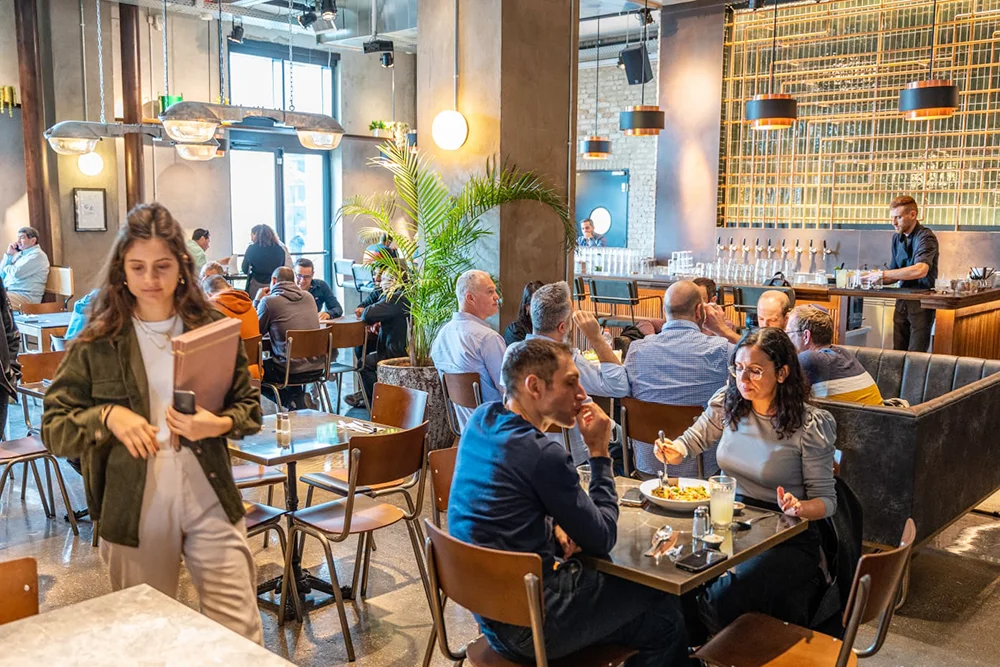
The icing of the cake was when Dror Erez, accomplished restaurateur joined the team bringing with him expertise of bars and restaurants. The first branch of Jems was the already mentioned brew pub in Petah Tikvah. They have recently moved to a spacious, new premises, which is a bar, restaurant, event hall and entertainment center all in one. My first time there, the band happened to be rehearsing for their evening live music performance. It was a little noisy, but I was there at 17.00 hours in the afternoon. It is apparently a place full of content. The food is good. I can vouch for their spicy Diablo Sausages and the large Schnitzel de Luxe. You won’t go hungry. In all they have no less than thirteen outlets, some directly managed and others are franchises.
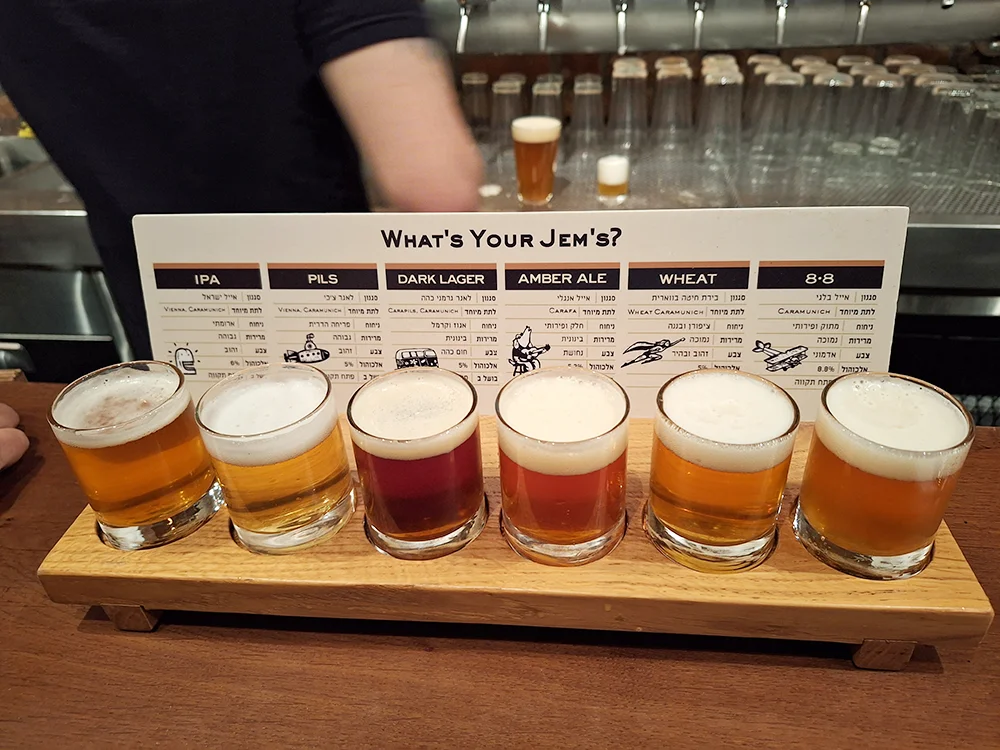
Jem’s Beers are natural and fresh being unfiltered, not pasteurized, without preservatives, flavorings or coloring. They are made in small batches to ensure maximum freshness. Jeremy makes beers through instinct and feel. He does not have a beer making manual to hand. Like the great chefs, he follows what seems to him to be right. I was provided with a tasting sample tray of six beers in order of bitter to sweet: IPA (inspired by Britain), Pils (Czech), Dark Lager (Germany), Amber Ale (Britain), Wheat Beer (Germany) and 8.8 (Belgium.) They are made to be true to the classic style made in the country that made them famous, but all are tweaked to be suitable for the Israeli palate. Having been weaned on Bass Ale, Charrington IPA and Worthington White Shield, I liked the Jem’s IPA best. I also loved that the Wheat Beer was served with a thin slice of orange in it. Totally original and it worked!
Recently Carmel Corp, the parent company of Carmel Winery, our largest winery, became a public company. They have a 30% share in soft drinks company, Jafora Tabori and have in the last couple of years become a very significant player in the beer market. I was a witness to the few times over many years, that Carmel dipped its toe in the beer market, but never ever succeeded. With the current management, that is no longer true. They started distributing Jems, along with Alexander from Israel and Krombacher from Germany. Then they closed a deal with Molson Coors, the third largest beer company in the world, to represent Miller from America and Staropramen from the Czech Republic. The most recent news is that they have an agreement with AB InBev, the largest beer company in the world, to represent Hoegarden, Leffe and Stella Artois from Belgium and Corona from Mexico. It is a pretty impressive portfolio, which puts Carmel squarely as the third force in the beer stakes behind Tempo (Goldstar, Heineken) and IBBL (Carlsberg, Tuborg.) In view of the history, it is a nice development. What goes around, comes around.
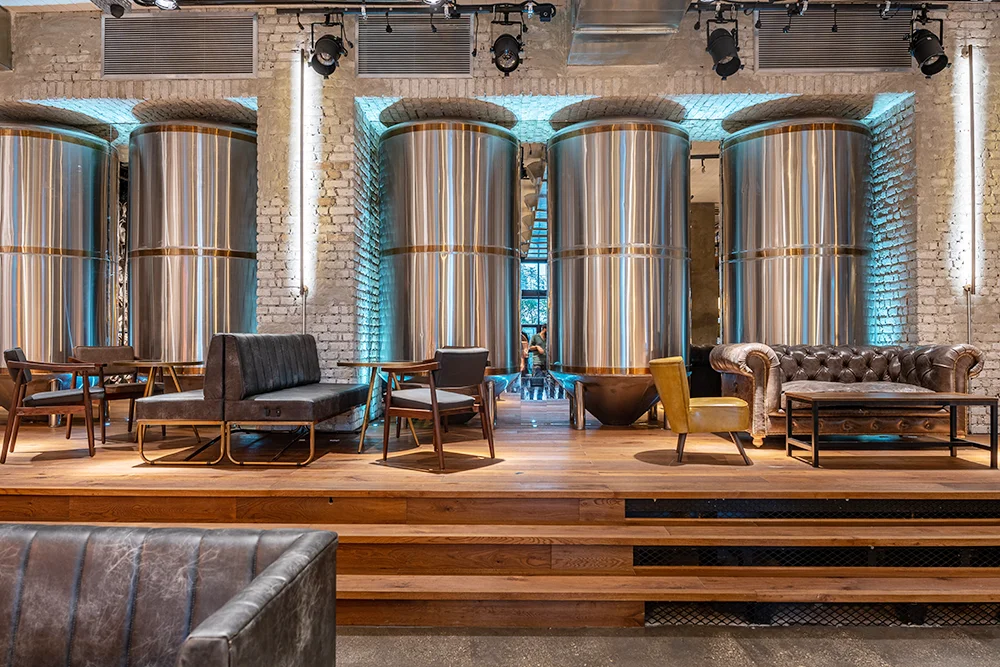
As I sat at the Jem’s Bar in Ra’anana, with an IPA in hand and a tasty panini to eat, I heard story of the Jem’s Beer Factory. Jems is arguably our most successful craft brewery and I determined this would be not be the last time that I would go there. Beer, food and great people is a holy trinity producing its own magic.
Adam Montefiore is a wine trade veteran and a winery insider turned wine writer, who has advanced Israeli wines for 35 years. He is referred to as the English voice of Israeli wine and is the Wine Writer for the Jerusalem Post. www.adammontefiore.com












